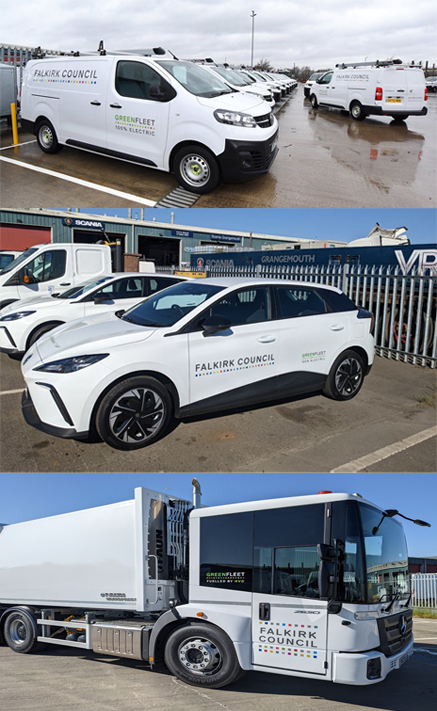At Falkirk Council, the aim is to reduce our carbon footprint. One way we are doing this is by the Green Fleet.
Electric vehicles

We currently have 129 electric vehicles in our fleet, this represents approximately 18% of the road going vehicles in the council. This consists of a mixture of cars, small vans and large vans. These vehicles are spread throughout the council and are used in the delivery of several services.
Electric vehicles are among the cleanest forms of transport with zero tailpipe emissions and so will form an integral part of the council's goal of have a zero emission fleet. Falkirk Council is committed to investing in electric vehicles to improve air quality and reach climate change targets.
Some benefits of using electric cars:
- No exhaust particulates, improves local air quality
- Zero emission, better for environment
- Reduced noise, quieter streets
We operate 102 electric vehicle charging points dedicated for fleet vehicles, which means they can be used across the district without dependence on public charging network. These are strategically located to allow for the expansion of the fleet.
Hydrogenated Vegetable Oil (HVO)
We have trialled Hydrogenated Vegetable Oil (HVO) in 17 of our heavy good's vehicles since the start of 2022 - 14 refuse collection vehicles and 3 roads vehicles run on HVO.
HVO is made from cooking and vegetable oils and performs in exceptionally cold environments. HVO is a low carbon, low emission, fossil-free and sustainable alternative to conventional fossil diesel. It is fully interchangeable with conventional diesel and can be mixed at any percentage.
The feedstocks used to manufacture HVO are from 100% waste, drawn from primary sources (such as used cooking and vegetable oils). All raw materials are checked and verified, and the fuel’s credentials are audited by the Department for Transport (DFT) to ensure both the sustainability and product integrity are certified.
Using HVO instead of using traditional fossil fuels such as diesel saves a huge 90% on Falkirk Council's carbon footprint and supports Scotland's Net Zero targets. To date this year, the refuse collection vehicles have used 166,000 litres of HVO, saving almost 400 tCO2.